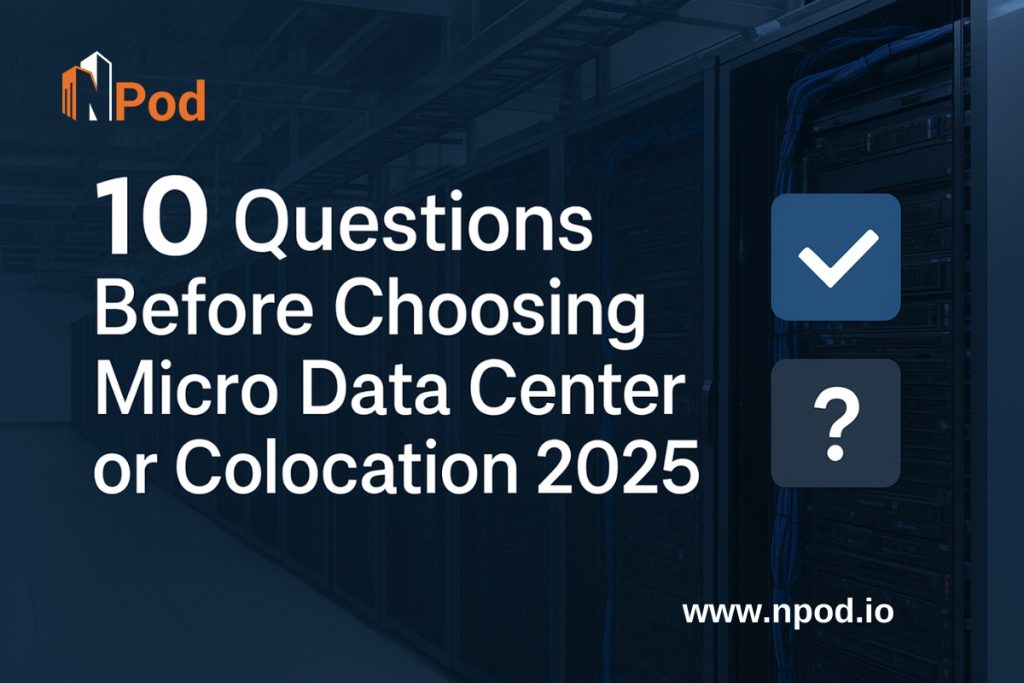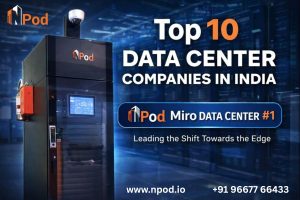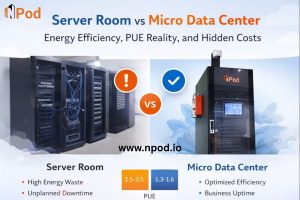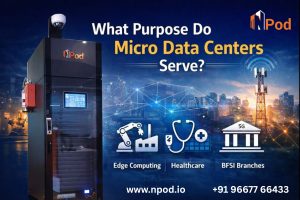With the rise of digital businesses, the demand for effective, reliable, and scalable IT infrastructures has reached new heights. A number of companies are standing at a crossroads: should they go for a micro data center or choose a traditional colocation facility? Though both serve as a means to accommodate and manage IT assets smoothly, there is a big difference in terms of price, scalability, degree of control, and the deployment speed.
By reading this blog, you can find out the 10 key questions you have to ask yourself before proceeding with a micro data center or colocation in 2025. Besides that, we will also share the data center performance perspective of the 10pb Cloud Storage trend and the advanced cooling technology trend.
-
What Are Your Scalability Needs?
In case you decide on a micro data center, the first thing you should do is to analyze the future expansion of your company. The facilities of colocation have a certain area and a fixed number of resources, by giving you compartmentalized growth, allow you to adjust the hardware of your company to the size of your business.
See the ways that 10pb Cloud Storage can be used with your micro data center to take advantage of on-demand data storage.
-
How Important Is Deployment Speed?
Micro data centers are the best option in case rapid deployment is required by your business. In a matter of weeks, they can be pre-fabricated and put into operation on the premises, whereas colocation facilities may take several months for the installation and planning.
-
Do You Require On-Premises Control?
In colocation, your server is housed somewhere else (off-site), so you can’t have direct control over the hardware, or access it. On the contrary, a micro data center allows you to have complete control over the site, hence, it can improve operational efficiency, take care of maintenance, and guarantee security at the same time.
-
What Are Your Budget Constraints?
The cost factor is very important when it comes to making choices. Generally, a colocated facility is operating under monthly rental fees and the micro data centers will have the initial part of the investments higher but with lower operating costs in the long run. As far as power, cooling, and security are concerned, it can be the one to provide a brilliant return on the investment over a long period.
Cut operational costs more effectively by adopting cooling systems that are specially designed for micro data centers, leading to lower energy usage and maintenance expenses.
-
How Critical Is Data Security?
Security of information is one of the major concerns for any company. Micro data centers give businesses the opportunity to implement advanced security, such as fire protection, limited access, and state-of-the-art surveillance, thus allowing the security of highly sensitive data. Colocation facilities are not without security; shared infrastructure, however, could still pose a problem for high-compliance sectors like finance or healthcare.
-
What Level of IT Support Do You Need?
Colocation usually requires you to depend on the provider for routine maintenance. Micro data centers allow you to employ direct on-site IT staff, therefore you can expect faster reaction times and better service of your critical applications.
-
Are You Considering Hybrid or Edge Computing?
Micro data centers are perfect for companies using edge computing or hybrid cloud strategies. They can be set up closer to users and thus, latency can be minimized and the performance of applications will be improved. On the other hand, colocation facilities are located in a centralized position making it difficult for apps that are sensitive to latency to perform quickly.
Utilize the benefits of your data center with 10pb Cloud Storage to create a hybrid solution, which not only makes the access high-speed but also provides secure cloud backup.
-
How Reliable Is the Power and Cooling Infrastructure?
Particularly consistent power and effective cooling are two of the most vital needs of any data center. Micro data centers in most cases, are equipped with complete cooling systems as well as UPS solutions facilitating the maintenance of optimal temperatures as well as uptime. Shared cooling services are provided by the colocation facilities which might not always be tailored for your unique requirements.
-
What About Compliance and Regulations?
Healthcare, finance, and government industries are good examples of those strictly regulated. A micro data center laid on premises can be designed in a way to comply with regulations while colocation facilities might need additional inspections and modifications to comply.
-
How Flexible Is Your IT Infrastructure?
Flexibility should be the last question on your mind. Micro data centers come with modular and adjustable business configurations that help enterprises to improve storage capacity, merge latest technologies, and even cope with transitioning workloads. On the other hand, colocation is not that flexible and most of the time, it requires you to have long-term agreements and less customization.
Conclusion
The choice between micro data centers and colocation facilities in 2025 is contingent upon business priorities, i.e., scalability, control, deployment speed, and long-term cost. Companies that commit to flexibility, on-site control, and integrated infrastructure are the perfect candidates for micro data centers. Multi-using them with 10pb Cloud Storage and advanced cooling systems, firms go beyond stable, high-performing, and future-proof IT infrastructure.
FAQs
- What is a micro data center?
A micro data center is a self-contained server, storage, networking, power, cooling, and management unit of compact and integrated IT infrastructure, purpose-built for on-site deployment.
- Would micro data centers be able to fully replace colocation facilities?
Although they empower flexibility and on-site control, certain large-scale workloads might still necessitate a colocation facility. A majority of businesses implement a hybrid approach.
- How does 10pb Cloud Storage work with micro data centers?
It is an offsite, large-scale, and elastic cloud backup storage platform. It facilitates seamless hybrid storage and disaster recovery for micro data centers.
- Are micro data centers energy-efficient?
Indeed, contemporary micro data centers are equipped with efficient cooling and UPS solutions that help in cutting down on energy and operational costs.
- How fast is a micro data center deployment?
Generally, it is accomplished within weeks if not days as compared to traditional colocation facilities, which take months allowing businesses to rapidly extend their IT infrastructure.






